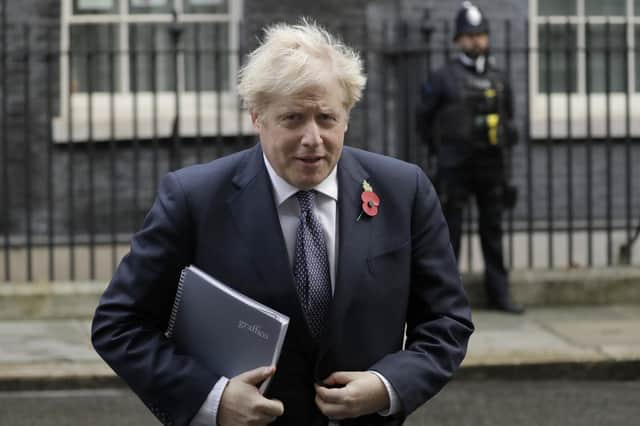How can Boris Johnson spending billions on defence be justified? Lesley Riddoch


The Prime Minister wanders Downing Street under a near-permanent deluge of credibility-destroying downpours, but appears to emerge completely unscathed.
Last week was no exception.
The BMJ, one of the world’s oldest medical journals, published an outspoken editorial asserting that ‘science is being suppressed for political and financial gain’ in the style of ‘history’s worst autocrats and dictators’ and that Covid-19 has ‘unleashed state corruption on a grand scale’, allowing Westminster politicians and parts of industry to indulge in ‘opportunistic embezzlement’.
Advertisement
Hide AdAdvertisement
Hide AdCould a more serious allegation be made by a more respected and impartial source?
Yet the story was rapidly overshadowed by the next rain cloud - news that a Spanish businessman had been paid £21million as middle man in a flawed Covid PPE deal - rapidly followed by a full monsoon storm, when Boris overruled advice that Home Secretary Priti Patel had breached the ministerial code by “shouting and swearing” at Home Office staff.
It’s apparently the first time the code has been breached without a minister losing their job or choosing to resign and may be the first time a Prime Minister’s been caught red-handed trying to ‘water down’ an awkward report.
It may also be the first time Tory MPs - ordered to “form a square” around their under-fire Home Secretary with supportive tweets - simply failed to comply. It seems fewer than a quarter of Tory MPs obliged.
But mud scarcely had time to stick in the whole sorry Prittster debacle before the next storm - Jolyon Maugham’s weekend announcement of crowd-funded action over the legality of recent appointments, made without advertisement or competition and therefore potentially in breach of government recruitment rules.
The QC - who runs the not-for-profit Good Law Project - successfully challenged Johnson’s unlawful suspension of Parliament in 2019 together with Joanna Cherry and other Scots politicians.
In his sights now are Kate Bingham, a venture capitalist who heads Britain’s vaccine task force; Dido Harding, who lacks public health experience but leads England’s failing Test and Trace system and Mike Coupe, who has – of course – no public health experience despite being chosen to run COVID-19 testing.If the Good Law Project wins, it could be proof positive that cronyism is the ‘new normal’ at Westminster.
Doubtless though, with Boris Johnson’s talent for out-running trouble by provoking even greater calamities, the verdict will be announced the same day as his Brexit Deal/No Deal. He has that kind of chaotic luck.
Advertisement
Hide AdAdvertisement
Hide AdPerhaps the most astonishing development though, has also been the least remarked upon.
Weeks before Brexit - guaranteed to damage our economy - in the middle of a second English lockdown, and just days before Rishi Sunak announces a public sector pay freeze to help finance vaccines, furlough and lockdown, Boris Johnson has announced that Britain will spend an extra £4 billion a year on . . . defence. Yip, defence.
Not nurses pay, (well, they don’t strike, do they) kids school meals (charity does the job so effectively), subsidies to help consumers green their homes and vehicles (hardly the grand gestures that win votes) or a down-payment on that Brexit dividend - £350m-a-week for the NHS (does anyone seriously remember that?).
No, the top priority for extra government spending is ‘defence of the realm.’
Really?
Britain currently spends more on defence than any other European nation except France - England’s long-time rival. So, perhaps this massive expenditure is a way to look big, puffed-up and militarily threatening as Britain approached a crushing Brexit - a western version of the hollow, pointless and economy-sapping show of military might that long preoccupied the Soviet Union. Is it really a feather in Britain’s cap to be eighth in international rankings of military might, despite being just 21st by population size and located in the world’s most peaceful region?Splashing out on new army robots and a "space command" while cutting the international aid budget and capping the pay of frontline staff and key workers - are those the priorities of most British voters, or almost any Scots?
And yet, where is the uproar or opposition to the largest increase in military spending for 30 years?
Unbelievably Labour's shadow defence secretary John Healey described the news as "welcome and long-overdue" - desperate to avoid being described as unpatriotic.
The SNP has yet to formally respond but has recently rattled pro-independence commentators by talking about multilateral not unilateral nuclear disarmament. Is it left to peace campaigners to oppose a rise in militarism that wasn’t promised in any manifesto, demanded by the public, relevant during a pandemic or particularly safe, given this government’s proven proclivity for favouring pals with multi-million-pound contracts?
Advertisement
Hide AdAdvertisement
Hide AdPresumably the Prime Minister hopes extra military spending will boost the appearance of ‘taking back control’ (after all, getting on a tank seemed to work for Ruth Davidson).
But will voters in Red Wall seats see defence jobs as a higher priority than some immediate and serious ‘levelling up” in the North?
No doubt, Boris will keep ducking criticism, changing subject and bouncing the country into more needlessly dramatic emergencies - the better to escape real challenge and scrutiny.
But he shouldn’t delude himself.
Slowly, imperceptibly, the political climate is changing - and a hard rain’s going to fall.
Comments
Want to join the conversation? Please or to comment on this article.